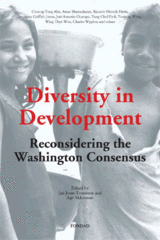Diversity in Development: Reconsidering the Washington Consensus
|
Contributing authors:
Choong Yong Ahn,
Alicia Bárcena,
Amar Bhattacharya,
Anthony Boote,
Ariel Buira,
Roy Culpeper,
Zdeněk Drábek,
Ricardo Ffrench-Davis,
Roberto Frenkel,
Stephany Griffith-Jones,
Esteban Jadresic,
Brian Kahn,
José Antonio Ocampo,
Yung Chul Park,
Joseph Ramos,
Barbara Stallings,
Osvaldo Sunkel,
Jan Joost Teunissen,
Yunjong Wang,
Wing Thye Woo,
Charles Wyplosz
Editors: Jan Joost Teunissen and Age Akkerman Summary
A book that discusses what development strategies would work best today in Asia, Latin America and Africa by following - or not - the recipes of the Washington Consensus.
Contributing authors include leading experts from academic and policymaking circles who are actively involved in debates about financial stability and development. Diversity in Development: Reconsidering the Washington Consensus explores what is right and what is wrong with the policies prescribed by the Washington Consensus. Contributing authors include professors of economics from Asia, Latin America, North America, Africa and Europe, former ministers and central bankers, and high-level officials of the World Bank, WTO, IMF and United Nations. These leading experts on finance and development discuss their – sometimes conflicting – views in a refreshing and in-depth manner. The dramatic shift in the 1980s from state-led development to neo-liberal market economic reforms has been actively promoted by international financial institutions like the IMF and World Bank and has become known as the “Washington Consensus”. Even though the reform agenda of the Washington Consensus has evolved from a focus on economic liberalisation and privatisation to the recognition that institutions are equally important, the results of the Consensus are mixed and have led to widespread criticisms. Diversity in Development: Reconsidering the Washington Consensus addresses the important question of what development strategies would work best today in Asia, Latin America and Africa by following – or not – the recipes of the Washington Consensus. It offers a rich diversity of visions on development and explores how financial stability could be enhanced at both the national and international levels. Quotes
"The Washington Consensus is the farce that the development establishment in Washington foisted upon the developing world as universal science..." Wing Thye Woo, University of California "...the international divergence of income levels and high financial volatility in both the developed and the developing world are increasingly seen as inevitable outcomes of the neo-liberal global order." José Antonio Ocampo, Economic and Social Affairs of the United Nations "There is strong evidence that trade liberalisation has helped growth and has not worsened inequality..." Anthony Boote, Policy Development and Review Department, IMF "The science of economics, the economics profession and international economic organisations cannot continue to ignore the social, political and cultural effects of globalisation and neo-liberal policies." Osvaldo Sunkel, Corporación de Investigaciones del Desarrollo, Chile Contents
Contents, Abbreviations & Notes on Contributors
1 The Need for Visions on the Economy: By Way of Introduction 2 Serious Inadequacies of the Washington Consensus: Misunderstanding the Poor by the Brightest
3 The Dogmatism of the Washington Consensus
4 The Need for a More Flexible Approach to Development
5 Globalisation and the Development Agenda 6 Improving Rather than Abandoning Reforms 7 The Widening and Deepening of Democratic Development 8 Reforming the Reforms of the Washington Consensus
9 “Right” Prices for Interest and Exchange Rates Part II: Financial Stability at the National, Regional and Global Level: Governance, Markets and Institutions 10 Financial Instability in Emerging Market Countries
11 Competent Institutions and Selective Globalisation 12 In Search of a New East Asian Development Paradigm 13 Path-Dependent Reforms of the East Asian Development Model 14 East Asian Cooperation, Social Policies and the WTO
15 The Search for a Stable and Equitable Global Financial System
16 Global Crisis Prevention and Liquidity Provision
Part III: Towards a New Development Agenda
17 Africa and the Washington Consensus
|
 € 17,50
Order now
December 2004 |










 Download Book as PDF
Download Book as PDF